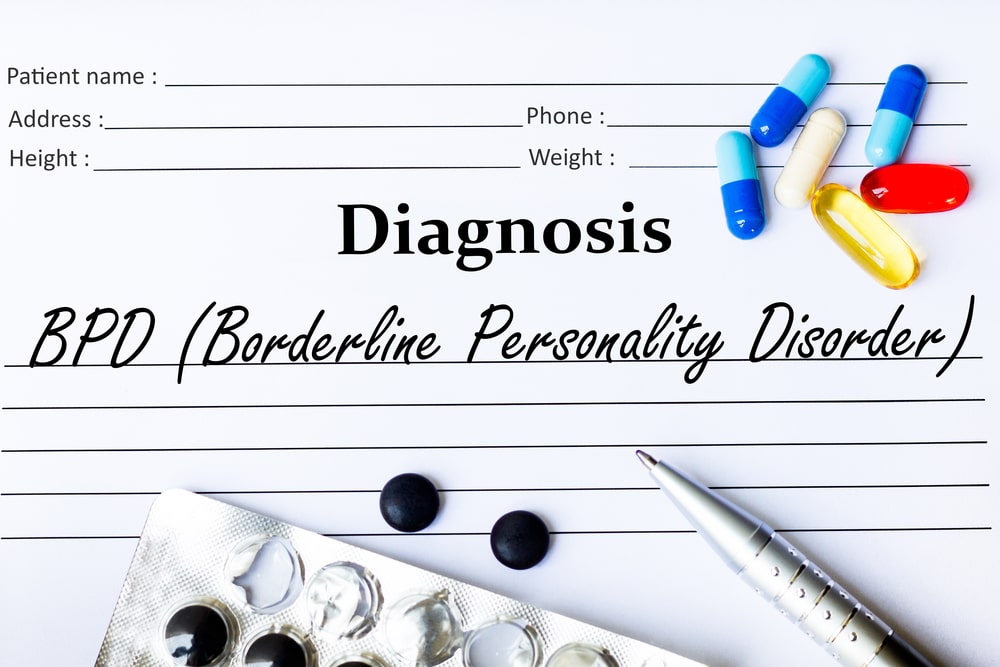
Borderline personality disorder (BPD) is a serious, lifelong condition that causes severe impairment in interpersonal relationships and distorts the patient’s view of themselves and others. BPD is an often misunderstood and misdiagnosed condition, and the severe pain and havoc it causes in the sufferer’s life can lead to self-medicating and addictive behaviors. Close to 4 million U.S. adults have the disorder, and between 50 and 70% of people with BPD will also struggle with a substance abuse disorder.The following article will explore the symptoms of borderline personality disorder and why the people who live with it are at high risk of addiction and substance abuse.
What is borderline personality disorder?
An individual’s personality is a fixed set of organized and dynamic characteristics that influence the way a person thinks, acts, and behaves in their interpersonal relationships. In healthy individuals, a person’s personality is static and consistent. Their personality functions to express their needs and motivations. In a person with BPD, however, personality is not fixed and is dysfunctional.
In people with borderline personality disorder, their personality is fluid and also distorted. An individual with BPD will exhibit a lifelong pattern of behavior and experiences that deviate markedly from the expectations of the individual’s culture. Their personality patterns are pervasive and also inflexible, and the onset of the disorder starts in either adolescence or young adulthood. These personality dysfunctions are stable over time, and cause marked distress in a person’s life. For someone to meet the diagnostic criteria for a personality disorder, these dysfunctions cannot be caused by drugs, alcohol, another mental health condition, or a traumatic brain injury. People with BPD will exhibit the following symptoms:
- An unstable sense of self
- Feelings of shame and inner emptiness
- Efforts to avoid real or perceived abandonment
- A pattern of unstable personal relationships
- Splitting themselves and others
- Self-harming behaviors
- Impulsivity
- Intense, severe mood swings
- Irrational anger
- Problems trusting others or irrational fear of other people
- Dissociation or feelings of unreality, particularly during stressful events
BPD will affect people in different ways, and not everyone with the disorder will have every symptom. Also, the severity of the disease will differ for each person. In most cases, clinicians look for patterns and unstable relationships over time. But at its core, borderline personality disorder is an intense fear of abandonment. Ordinary events can trigger symptoms if the person with BPD perceives that someone is about to leave them. This is why BPD sufferers have the most problems in interpersonal relationships, and those with milder forms of the disorder can function well at work or school. Minor separations, such as a significant other going on a business trip, can trigger a feeling of abandonment in the BPD sufferer and cause them to act out.
Who is most likely to develop borderline personality disorder?
There is no single cause of BPD, but research suggests that a multitude of different BPD risk factors can trigger or increase the likelihood of the illness.
Genetics
People who have a parent or a sibling with BPD are at a higher risk of developing the disorder too.
Brain Structure
Brain imaging scans show that people with BPD have structural differences in the areas of the brain that control impulses and emotional regulation. Researchers are unclear if these structures cause the disorder, or if the disease causes structural changes in the brain.
Environmental Factors
People with BPD often report trauma, abuse, or severe adversity during childhood. Being exposed to a hostile or invalidating environment or relationships as a young child can also trigger the disease.
While all of these factors may increase the risk of developing the condition, they do not mean that someone will always develop BPD if they are exposed to these risk factors. People who do not experience adversity in childhood or have a family member with BPD can still develop the condition.
What are the signs that someone has BPD?
If a person exhibits a pattern of unstable, intense personal relationships and interpersonal conflict, they may have a personality disorder. In BPD, these conflicts are triggered by the person’s fear of abandonment, whether real or perceived. These intense fears and conflicts can cause a lot of pain and suffering in a person’s life, and may even prevent them from holding down a stable job. In addition, the only treatment for BPD is lifelong, continuous and intense therapy. There is no medication for BPD, although a person can find relief from co-occurring mental health disorders that BPD can cause, such as depression and anxiety, with medication.
Because BPD causes intense, emotional pain and also impulsivity, people with BPD are at high-risk of abusing drugs or alcohol as a way to cope with their condition. Drugs and alcohol can make symptoms of BPD worse. It is crucial that patients with BPD and co-occurring substance abuse seek treatment for their disorders. Inpatient rehab centers are equipped with mental health resources for people with co-occurring mental health conditions and drug addiction.
What kind of treatment is available for BPD patients?
Dialectical behavioral therapy (DBT) is one of the most promising treatment methods for BPD sufferers. DBT helps patients regulate their emotions and control impulsive and harmful urges. Usually, DBT involves individual and group work and encourages patients to practice mindfulness and meditation. DBT can help reduce self-harming and suicidal behavior and treat substance abuse disorder.
Cognitive behavioral therapy can help BPD patients address their negative thinking patterns and unhealthy behaviors associated with the disorder. CBT teaches patients effective coping strategies for negative thoughts.
Mentalization-based therapy or MBT teaches BPD patients how to become conscious of their internal states, how to explore their emotions and develop healthy ways of interacting in their relationships.
Although there is no medication for BPD, patients can go on to live a healthy life free from intense interpersonal conflict and substance abuse with adequate mental health treatment plans. To help a friend or a loved one with this disorder, offer patience, understanding, and support. Encourage your loved one to reach out to a therapist and seek treatment for the disorder.
What is Borderline Personality Disorder?
Borderline personality disorder is a mental illness diagnosed by ongoing mood instability, relationship problems, impulsive behaviors and a fluctuating identity.
When left untreated, it can cause irreparable damage to the relationships someone has with their friends and family. In addition, this disorder can also cause a person’s views of themselves to shift radically.
Borderline personality disorder sometimes misdiagnosed and in some cases, completely overlooked. A common theory regarding BPD is that people downplay it because they are unaware of what it truly is and how it affects a person.
Our personalities are what ultimately influence how we behave, think, and feel. While it’s normal to have high and low moods every now and again, rapidly shifting moods aren’t.
An example of this would be someone acting happy only to become enraged without provocation. Random fits of anger are also one of the symptoms of BPD. In some cases, this shift lasts for days at a time and may not have an apparent cause. Because of how suddenly someone can change, this makes them unpredictable and potentially dangerous to themselves and other people.
Having a negative outlook on yourself, and life in general often drives someone to seek comfort from substance use. Taking drugs, drinking alcohol, and even eating can become an addiction. In fact, a dual diagnosis with BPD is not uncommon. Approximately 4,634,000 people in the United States suffer from BPD with about 75 percent of cases being women.

What are the signs of borderline personality disorder?
There are many signs that point to someone suffering from of BPD. Some of these symptoms can be shrugged off as “normal,” which is another reason people overlook this disorder.
Here is a list of the symptoms of BPD can exhibit:
Not everyone with BPD is going to exhibit the same symptoms, but that doesn’t mean there isn’t a need for BPD treatment. If you or someone you’re close with is having suicidal ideation, you need to seek help at the hospital where they can direct you to a Southern California Rehab like Mission Harbor.
Addiction
As you now know, people with BPD often also suffer from addiction. However, the reason for developing an addiction does vary from person to person. Some people may feel alone and try to numb their pain. Others use their choice of addiction as a distraction to how they are feeling.
Others may indulge in reckless behaviors out of impulse. Regardless of the reason, having an addiction on top of a mental disorder, especially one as severe as BPD, can destroy a person.
Common signs of addiction include:
Aside from helping with BPD, Mission Harbor is a Southern California Rehab can also help with addiction treatment as well.
If you suspect you or someone else has BPD, we’re here to help. Mission Harbor offers its patients high-quality BPD treatment. Contact us at 805-209-4446 to receive help today.
Updated on 12/24/20

